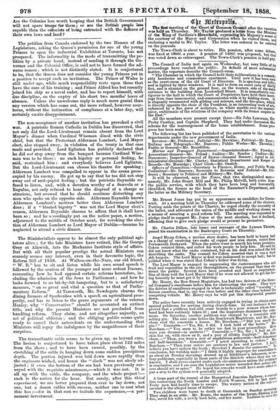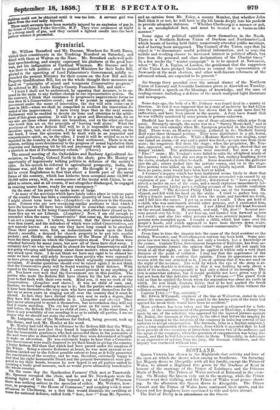( 1gf 33lfif1111111i5.
The first meeting of the Court of Common Council after the vacation was held on Thursday. Mr. Taylor produced a letter from the Minister of the ring of Sardinia's Household, expressing his Majesty's sense of the courtesy of the Mayor and Corporation when he visited them, and enclosing a medal to Mr. Taylor. The letter was ordered to be entered on the journals.
The Town-Clerk is about to retire. His pension, after come debate, was fixed at 10001. a year. A pension of 1400/. was proposed, but that was voted down as extravagant. The Town-Clerk's pension is half-pay.
The Council of India met again on Wednesday, but very little of its proceedings have reached the public. In default of more aubetantial matter, the reporters describe the Council-room.
" The Chamber in which the Council hold their deliberations is a remark. ably handsome and commodious apartment. Until now it has been need as the court-room of the old Court of Directors. It is spacious and lofty, and is lighted by three windows. It is said to form an exact cube of thirty feet, and is situated on the ground floor, on the western side of the ' entrance to the building from Leadenhall Street. It is immediately con- tiguous to the hall in which the Court of Proprietors have held their meet- ings from time immemorial, and communicates with it by folding-doors. It is elegantly ornamented with gilding and mirrors, and the fire-place, which is directly opposite the chair of the President, is an interesting work of art, enhanced by a fine piece of sculpture, in white marble over the mantel- piece, emblematic of the relations of the company with its former empire in the East."
All the members were present except three—Sir John Lawrence, Sir Proby Cautley, and Captain Shepherd. They had under discussion the scheme for the rearrangement of the home establishment. Some pro. gress has been made.
The following list has been published of the secretaries to the various departments under the new government of India.
Revenue—Mr. Prideaux ; Judicial—Mr. Hawkins ; Political—Mr. Kaye ; Railway and Telegraph—Mr. Danvers ; Public Works—Mr. Thornton ; Public or General—Mr. Bourdillon.
Marine and Transport Department —Superintendent—Mr. Plowden; Accountant-General—Mr. Fnend ; Auditor—Mr. Sandoz ; Cashier—Mr. Dunsmure; Inspector-General of Stores—General Bonner; Agent to Ad- ministrator-General—Mr. Clarke • Statistical Department and Keeper of Records—Mr. Hornidge; Chief Clerk—Mr. Onslow. Officers of Committees.—Secretary to Finance, Home, and Public Weris Committee—Mr. Danvers ; Secretary to Revenue and Judicial—Mr. Pri- deaux • Secretary to Political and Military—Mr. Fade. It will be observed, says the Times, that two distinguished men— namely, Mr. John Stuart. Afill and Mr. Philip Melvin, both retire from the public service, with which they have been long and honourably identified, the former as the head of the Firsiminer's Department, and the latter as the Military Secretary.
Mr. Ernest Jones has put in an appearance as candidate for Green- wich. At a meeting held on Thursday he addressed some of the electors. Putting aside the points of the Charter, he urged chiefly the necessity of the ballot, and advocated the union of the middle and working classes as a means of securing a good reform bill. The meeting was requested to pledge itself to support Mr. Jones at the next election, but it declined, affirming that to give such pledge would at present be premature.
Mr. Charles Dillon, in lessee and manager of the Lyceum Theatre, passed his examination in the Bankruptcy Court on Thursday.
Angel Hyam Cohen, a marine store dealer, has been held to heavy bail on a charge of receiving two casks of copper and iron stores, stolen from Portsmouth Dockyard. When the police went to search his large premises, Cohen resisted them, and called his work people to help him. He said he did not know what the casks contained, but on his desk was seized the bill describing the casks. The counsel for Cohen asserted that it was a kith fide bargain. The Lord Mayor at first was indisposed to accept bail; but he yeilded when it was stated that Cohen's father was dying. The Lord Mayor is engaged in suppressing the costermongers who sell fruit and vegetables in the city thoroughfares, on the ground that they ob- struct the public. Several have been arrested and fined or imprisoned. One of them told the Lord Mayor that if he were not allowed to get his liv- ing honestly he must get it by thieving. Mr. Henry, the Bow Street Magistrate, has had two drivers of the Gene- ral Company's omnibuses before him for obstructing the roads. They were the drivers of omnibuses engaged in what is technically called " nursing ' a Saloon omnibus, that is, one was close before and the other close behind the competing vehicle. Mr. Henry says he will put this disgraceful practice down.
The police have recently been actively engaged in trying to obtain cases against publicans for serving during church-tame. In one instance it was proved that a publican had sold some brandy to a poor woman whose him- band had been suddenly taken ill ; and the magistrate dismissed the sum- mons. On Saturday, another publican was charged by a constable with selling gin. The case came before the Southwark Magistrate, and Mr. Bur- cham read the constable a lesson. Mr. Burcham.—" Did you smell the gin ?" Constable.—" Yes, Sir, I did. I took hold of the bottle." Mc. Burcham.—" You seem to be rather too feat in your proc,eedings. ROW were you dressed—in uniform? " Constable.—" /co, Sir ; I bad an oil- skin hat on, with straw on it, and a pair of oilskin leggings." Mr. Bur- cham.—" Then, you were a sort of amphibious policeman—half-fisherman and half-landsman." - Constable.—" I acted according to orders?' 3ir' Burcham.—" Then your orders are contrary to law and justice. I don't believe you have spoken the truth ; therefore I dismiss the summons!' In conclusion, his worship said—" I think it highly improper for constables to go about on Sunday .mornings dressed up as bricklayer's labourers, to en- trap publicans, especially in those parts of the districts where they are un- known. I shall never convict under such circumstances unless the evidence is conclusive, and I am sure the Legislature never intended that police (A' oars should act as spies." He hoped his remarks would have some effect to put a stop to the system now generally adopted.
A large part of the tunnel of the Hampstead Junction Railway,
line connecting the North London and North Western, fell in last week. Forty men bad hardly time to escape. The watery nature of the soil ex• created is the alleged cause of failure. Two children were burnt to death at Greenwich on Sunday morning. They slept in an attic. Mr. Roper, the master of the house, finding it OD curved fire, saved his wife, a newly born babe, and her nurse. Ladders to save the children could not be obtained until it was too late. A servant girl was taken from the roof sadly injured. Three maid servants have been mortally injured by an explosion of gas in the house of Colonel Fulke Greville, M.P. They were awakened at night by a strong smell of gas, and they carried a lighted candle into the back parlour whence it proceeded.



























 Previous page
Previous page